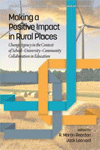
Making a Positive Impact in Rural Places
Change Agency in the Context of School-University-Community Collaboration in Education
Edited by:
R. Martin Reardon, East Carolina University
Jack Leonard, University of Massachusetts Boston (retired)
A volume in the series: Current Perspectives on School/University/Community Research. Editor(s): R. Martin Reardon, East Carolina University. Jack Leonard, University of Massachusetts Boston (retired).
Published 2018
Following on from the preceding volume in this series that focused on innovation and implementation in the context of school-university-community collaborations in rural places, this volume explores the positive impact of such collaborations in rural places, focusing specifically on the change agency of such collaborations. The relentless demand of urban places in general for the food and resources (e.g., mineral and energy resources) originating in rural places tends to overshadow the impact of the inevitable changes wrought by increasing efficiency in the supply chain. Youth brought-up in rural places tend to gravitate to urban places for higher education and employment, social interaction and cultural affordances, and only some of them return to enrich their places of origin. On one hand, the outcome of the arguable predominance of more populated areas in the national consciousness has been described as “urbanormativity”—a sense that what happens in urban areas is the norm. By implication, rural areas strive to approach the norm. On the other hand, a mythology of rural places as repositories of traditional values, while flattering, fails to take into account the inherent complexities of the rural context.
The chapters in this volume are grouped into four parts—the first three of which explore, in turn, collaborations that target instructional leadership, increase opportunities for underserved people, and target wicked problems. The fourth part consists of four chapters that showcase international perspectives on school-university-community collaborations between countries (Australia and the United States), within China, within Africa, and within Australia. The overwhelming sense of the chapters in this volume is that the most compelling evidence of impact of school-university community collaborations in rural places emanates from collaborations brokered by schools-communities to which universities bring pertinent resources.
CONTENTS
Making a Positive Impact in Rural Places: Change Agency in the Context of School–University–Community Collaboration in Education. PART I: TARGETING INSTRUCTIONAL LEADERSHIP. Learning by Leading in the Classroom: A Rural Research–Practice Partnership, Matthew Militello, Karen D. Jones, Lyndsey Dunn, and Courtney Marshburn Moffitt. Professional Learning in a Rural School Community: The Instructional Rounds Partnership, Rebecca Woodland, Rebecca Mazur, and Michael Sullivan. PART II: OPPORTUNITIES FOR UNDERSERVED. The Evolution of a Research–Practice Partnership: Examining the Recruitment and Retention of Teachers of Color in Rural and Suburban Contexts, Deanna Hill, Kristine Grant, and Circe Stumbo. Immigration, Race, and Rurality: Educational Experiences of Black African Immigrants in Rural America, Maraki Shimelis Kebede. Sustained and Sustaining Conversations: A Programmatic Approach to Narrating Resilience in Rural Ohio, Wendy Pfrenger, Erica Noll, and Austin Cope. Rural Education Institute: Nurturing Partnerships in Eastern North Carolina, M. Kristen Cuthrell. PART III: TARGETING WICKED PROBLEMS. Addressing Rural, Wicked Problems Through Collaboration: A Critical Reflection on a School–Community–University Design Process, Catharine Biddle, Ian Mette, Lyn Mikel Brown, Mark Tappan, Brittany Ray, and Sarah Strickland. The Heart of Our Community: Developing University–Assisted Community Schools in Rural Places, Lisa V Blitz, Elizabeth M. Anderson, Candace A. Mulcahy, and Laura Bronstein. Creating a Trauma-Informed Rural Community: A University–School District Model, Brenda M. Morton and Anna Berardi. PART IV: INTERNATIONAL PERSPECTIVES. Mobilizing to Shape Rural Outcomes: Perspectives of School–University–Community Partnerships in Rural America and Australia, Sheri S. Williams, Viola E. Florez, and George G. Otero. Supporting the Under-Resourced Rural Schools Through Partnership: A Case Study of Rural-Urban School Partnership Program in China, Wenfan Yan, Yumei Han, Ling Li, Naiqing Song, and Fangfang Guo. Rural Areas Are Not Hopeless, Noluntu Dyubhele. Transforming Science Teaching and Science Teacher Education Through an Australian University–School Partnership, Monica Green and Hongming Ma. About the Editors. About the Contributors.
-
Paperback978-1-64113-221-3
Web price: $45.04 (Reg. 52.99)
-
Hardcover978-1-64113-222-0
Web price: $80.74 (Reg. 94.99)
- eBook978-1-64113-223-7

- EDU052000 - EDUCATION: Rural
- EDU050000 - EDUCATION: Collaborative & Team Teaching
- EDU000000 - EDUCATION: General
-
 A Place Called Home
School-University-Community Collaboration and the Immigrant Educational Experience
A Place Called Home
School-University-Community Collaboration and the Immigrant Educational Experience
-
 Alleviating the Educational Impact of Adverse Childhood Experiences
School-University-Community Collaboration
Alleviating the Educational Impact of Adverse Childhood Experiences
School-University-Community Collaboration
-
 Innovation and Implementation in Rural Places
School-University-Community Collaboration in Education
Innovation and Implementation in Rural Places
School-University-Community Collaboration in Education
-
 Integrating Digital Technology in Education
School-University-Community Collaboration
Integrating Digital Technology in Education
School-University-Community Collaboration
-
 Learning to Read the World and the Word
School-University-Community Collaboration to Enrich Immigrant Literacy and Teacher Education
Learning to Read the World and the Word
School-University-Community Collaboration to Enrich Immigrant Literacy and Teacher Education
-
 School-University-Community Collaboration for Civic Education and Engagement in the Democratic Project
School-University-Community Collaboration for Civic Education and Engagement in the Democratic Project
-
 School-University-Community Research in a (Post) COVID-19 World
School-University-Community Research in a (Post) COVID-19 World

